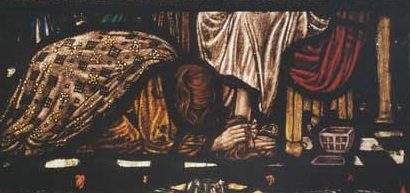As someone who is always on the lookout for neologisms that combine two words in punny fashion, it took me a moment to register that the word “anointment” is just an already-existing everyday word, and one that I already knew somewhere in the back of my mind, although I don’t use it often and so it took me a moment. But even so, it is probably the best word to use when talking about Jesus being anointed with ointment.
It is not a coincidence or mere happenstance that I am returning not only to blogging about my book project, What Jesus Learned From Women, but specifically to the story of Jesus’ anointment, on this Maundy Thursday. There are many unanswered questions about this event (or events – see below). But one thing seems clear to me. A woman washes Jesus’ feet, and then according to the Gospel of John, Jesus follows her example. He sees a woman breaking convention and humiliating herself in an act of kindness (the precise significance of which we don’t have space to get into here), and learns from her, following her example and in turn giving this example as teaching to his students.
As I alluded to above, one major question that faces interpreters of the Gospels is how to make sense of the divergent accounts of Jesus having a woman pour expensive perfume on him and/or wipe his feet with her hair. The really puzzling part is what to do with the version in Luke that is so very different. I am playing around with some possible ways to make sense of how the traditions might have developed, diverged, re-intersected, and cross-pollinated. Suffice it to say that I don’t think that it makes sense to posit two overly-similar incidents, perhaps one as a copycat of the other or as a repeat action by the same woman. I also don’t think that, once the tradition came to be associated with Mary of Bethany, the woman would have been turned into a “notorious sinner,” nor conversely, that once the tradition developed that this was done by a “sinful woman,” the name Mary of Bethany would have become associated with it. But I am open to being persuaded otherwise, whether by blog commenters or by the texts themselves!
One point that I definitely want to make is to highlight the way that male readers of the Gospel of Luke have consistently assumed that the woman has the reputation of being a sinner because of something to do with sex. Are men really that disappointingly predictable, that we cannot have our minds leap instead to the possibility that, as a woman in a patriarchal society, perhaps one who was widowed, or orphaned before she was married, engaged in notoriously unethical business practices in an effort to make ends meet as she tried to keep her late father’s or husband’s business afloat? And does it not say more about men reading the story, than about what is historically plausible, that many men will scoff at the above suggestion that other possible kinds of sins at least deserve to be considered, should come to mind as readily if not more so?

Also related to this topic is Scot McKnight’s post about Women’s History Month, as well as the following:
https://www.episcopalcafe.com/lavish-and-intimate/













